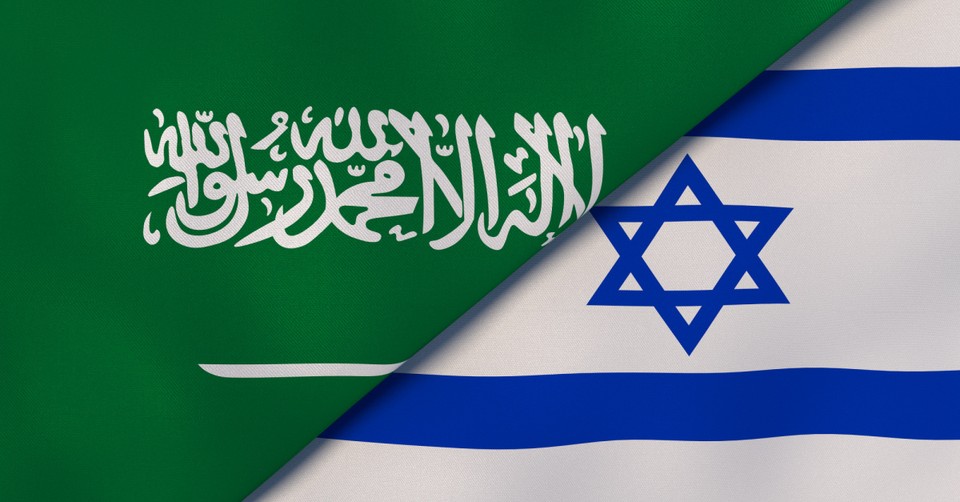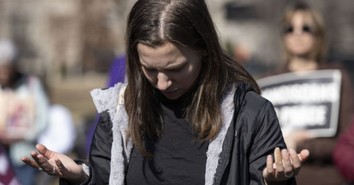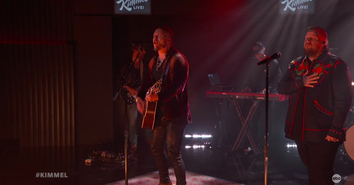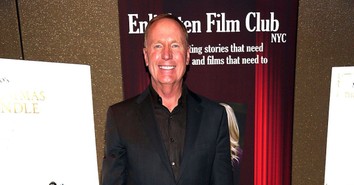The Saudis and the Ghost of Christmas Past

It’s unlikely that as worldly as he is, Saudi Crown Prince Mohammed bin Salman (MBS) ever read Charles Dickens original or saw the classic American movie based on Dickens’ book, “A Christmas Carol.” But it is a good metaphor for the feverish talk today of the normalization of relations between Saudi Arabia and Israel. If we replace the “Christmas Carol” character of Ebenezer Scrooge with the Palestinian Arabs, there is a contemporary lesson: that through reflection on past failures (the Ghost of Christmas Past and Ghost of Christmas Present), they can change their future.
Just as Scrooge, if Palestinian Arabs don’t see the transgressions of their past, they will be doomed to repeat their mistakes for generations to come. Learning from Scrooge is essential. It’s also a critical opportunity for Saudi Arabia either to help the Palestinian Arabs change, or to cut losses and move forward on their own so that they do not continually become victims of their own past failures, and billions of wasted investments.
Saudi Arabia’s Own Ghosts of the Past
First, the Saudis need to move beyond a few of their ghosts as well. Then, they can help the Palestinian Arabs move beyond theirs. Just like putting oxygen masks on in an airplane; first you need to help yourself before helping others. The 2002 Saudi Peace Plan offered Israel full diplomatic recognition, normalization, and peace with the entire Arab League, though that still seems like more of a fantasy than Scrooge revisiting his past. This would have required Israel to withdraw from all territory it took control of during the 1967 Six Day War (Jerusalem, Gaza, the Golan and Judea and Samaria, “the West Bank), the creation of a Palestinian state with its capital in Jerusalem, and some form of “return” of Palestinian Arab refugees.
As much as the Saudis staked out this position that is still talked about a generation later, they must realize it is a non-starter and does not reflect the realities of today, nor is is a cornerstone for the future.
The Changing Landscape of Middle East Politics
Then, it seemed like a fantasy as the Saudis were on the heels of being blamed for indoctrination that led to the largest terror attack in the world on September 11, 2001. They and their leadership, and the leadership of nearly all the Arab world not only publicly rejected Israel’s right to exist until that point, except for Egypt and Jordan, there were no meaningful overtures from any of the Arab world to recognize Israel’s legitimacy much less make peace. Israel was mired in what’s called the Second Intifada, with buses, cafes, malls, and hotels being systematically blown up by Palestinian Arab suicide bombers. Weeks later, Saudi national TV hosted a telethon for terrorists, raising nearly $12 million in the first hours. Israel was right to be skeptical, and the Saudi Peace Plan never went anywhere.
Today is a different world. President Trump orchestrated the Abraham Accords, creating not just peace and normalization of relations between Israel, Bahrain, Morocco, and the UAE but also cultivating thriving alliances. MBS has created a new vision for his country’s future, where conventional wisdom says that peace and cooperation with Israel can be an important pillar. Iran threatens Israel and the Saudis directly and through their proxies, so a robust alliance is essential and mutually beneficial. With Israeli flights now allowed to traverse Saudi air space, there are facts on the ground and in the sky that led to a mutual need to progress on normalization. Now that President Trump is back in the Oval Office, he's picking up where he left off, making relations with the Saudis, including Israel, a priority.
Why Is Saudi Arabia Still Waiting?
Yet, in public, at least, the Saudis remain stuck on the need for the creation of a Palestinian state before moving forward. More than the Saudis dwelling on the ghosts of past efforts to create a Palestinian state and envisioning a future that can bring true peace and prosperity to the Middle East, they need to realize that peace with Israel is not just a priority and in their own interests, but truly can be a foundation for regional peace and a hopeful future. That makes Saudi-Israeli relations something that supersedes most if not all, other issues in the region.
Simply, why should the Saudis link the success of their future to the failures of the Palestinians' past? Why shouldn’t MBS make a bold move to make this happen now, in a way that might coax the Palestinian Arabs to make bold choices for themselves and not be mired in the ghosts of their past? Why shouldn’t MBS, with wisdom and good intentions, make it clear to the Palestinian Arabs that the ghosts of funding their failed enterprise and terrorism are in the past, and the choice is theirs to move on or be stuck and doomed for their future?
The Moment for Bold Action
The 2002 Saudi Peace Plan was a bold move spearheaded by then-Crown Prince Abdullah bin Abdulaziz and endorsed by the Arab League in Beirut on March 28, 2002. With the anniversary of the Saudi Peace Plan just weeks away, perhaps MBS will use the occasion and world events to make an even bolder move. If Prime Minister Netanyahu were to invite the Saudi Crown Prince to come to Jerusalem and MBS did so, this would be a game changer not seen since Egyptian President Anwar Sadat came to Jerusalem in 1977.
The Crown Prince would be afforded every courtesy as a visiting head of state: visiting the Yad Vashem Holocaust Memorial, taken on a tour of the City of David where a Jewish king reigned 3000 years ago, being invited to speak at the Knesset, making a condolence visit at the sites and to families of the victims of the October 7 massacre, and visiting the Al Aqsa mosque, becoming the first Saudi monarch to pray at all three holy sites in Islam. He could even come to my house for Shabbat dinner.
MBS is one of the most savvy leaders in the Arab world, if not the entire world. He may believe that a long-term solution for peace in the Middle East requires a Palestinian Arab state. We can discuss that. But he’s certainly smart enough to know that this is not something any Israeli leader would sign on to today following the 2023 Hamas massacre. He also knows that Hamas is corrupt and represents a brand of Islam that he doesn’t want in his own kingdom and cannot be part of any future solution. And he knows that the Palestinian Authority is, at best, an inept kleptocracy that cannot lead its own people, much less win against Hamas in anything. Knowing this, MBS also knows that clinging to the establishment of a Palestinian state is basically a non-starter.
A New Era of Saudi-Israeli Cooperation
A generation ago, there were no known public contacts between Israel and Saudi Arabia. Now, not only have there been many known high-level contacts reported even between the Crown Prince and Israeli Prime Minister Netanyahu, but in an array of other areas as well. This is on top of the ones that we don’t know about.
In addition, Saudi Arabia and Israel have a common enemy, Iran, which is striving for nuclear weapons that will threaten both countries. The Iranians have attacked both Israel and Saudi Arabia directly as well as through their armed proxy in Yemen, the Houthis.
Simply, the world has changed, and Saudi Arabia and Israel each have common interests for their future that cannot be stuck in the mud of the present, and that must override past differences to really bring peace to the future.
A Historic Speech for a Historic Moment
Anticipating the Saudi Crown Prince’s imminent coming to Jerusalem, I have taken the liberty of drafting a speech for His Royal Highness for his visit to the Knesset next month. Inshallah. God willing.
A Call for Peace and Unity
In the name of Allah, the Beneficent, the Merciful.
Honorable President Herzog, Prime Minister Netanyahu, Esteemed Members of Government, Respected Religious Figures, Leaders of Israel, and all the people of Israel,
Today, I stand before you in the ancient and sacred city of Jerusalem, a city that carries the weight of history, faith, and yearning for peace in its very name. This city, revered by Muslims, Jews, and Christians, has been a beacon of spiritual devotion for millennia. It has witnessed both the greatest achievements of civilization and the deepest wounds of conflict.
I come before you as a son of the Arabian Peninsula, as a leader of the Kingdom of Saudi Arabia, and as a servant to the people of my nation and the Muslim world. And as a cousin.
But more than anything, I come before you as a fellow human being, as a believer in peace, and as a champion of a future where our children inherit stability, prosperity, and understanding rather than hatred, war, and division.
Breaking Free from the Chains of the Past
For decades, our two nations have walked separate paths, often defined by enmity and suspicion. We have been prisoners of history, bound by the narratives of the past, wary of each other’s intentions. But history is not written in stone. It is shaped by those with the courage to dream beyond the conflicts of yesterday. It is shaped by those who refuse to let fear dictate the future. And it is shaped by those who dare to extend a hand, even in times of uncertainty. That’s the vision that brings me to your parliament today, in your eternal capital.
We are gathered here at a moment of profound truth, one that demands honesty, vision, and resolve. The Middle East has suffered too long under the burden of war. Too many mothers have wept for their sons. Too many fathers have buried their children. Too many dreams have been shattered by violence, mistrust, and extremism. Today, I say Enough. Die. Halas.
Allow me to start with an honest but difficult reality: if we are going to move forward toward a shared future, we must be honest about our past.
A Vision for the Palestinian People
We in Saudi Arabia have long advocated for the right of the Palestinian people to dignity, statehood, and self-determination. Our commitment to their cause is unwavering. Justice demands that all people live in freedom and security. However, we also recognize the right of the Jewish people and all the people of Israel to live in peace and security, to build a future free of fear, and to be accepted in the region as legitimate, integral, and respected partners and good neighbors.
We recognize the ancient connection of the Jewish people in the historical land of Israel and do not seek to undermine that. We know that our mosque, the third most holy site in Islam, is built on the site of Solomon’s Temple. It was referred to as a House of Prayer for all Nations. My father, our king, shares the name of your king who built the Temple. We must learn to share not only our sacred spaces but the inheritance we share from our mutual forefather. Your history is not mutually exclusive to our history, and whether we like it or not, our futures are intertwined as descendants of Abraham.
The holy space that has been at the center of the storm must become, once again, a place of unity.
In what could have been a reunion fraught with strife, when Isaac and Esau meet after their father’s death, the reunion was a warm one, recorded in Genesis 32:4, “Esau ran toward his brother, embraced him, fell on his neck and kissed him.”
The Time for a New Beginning
For too long, our two paths and truths have been seen as irreconcilable. But today, I ask why must we choose between justice for Palestinians and peace with Israel? Why must one person’s suffering continue so that another’s security can be ensured? Must we be forever trapped in a zero-sum game where the pain of one side negates the aspirations of the other?
The answer is no. There is another path. A path where security is not built upon the suffering of others, where sovereignty is not denied but recognized, and where peace is not merely a temporary ceasefire but a foundation for lasting cooperation.
I know it would be hubris of me to stand before you today and suggest that Israel is, or ever was, the exclusive cause of the pain and suffering. Standing at this podium, which represents the success of more than a century of Jewish people’s restoration of their ancient homeland, indeed an enterprise that has become a blessing to the families of the world as you were charged in Genesis, I aspire the same prosperity and growth for our Palestinian brothers and sisters.
However, to our Palestinian brothers and sisters, I charge you today from this podium with a mandate to break the chains of your past and from leaders who have misguided and manipulated you, bringing you countless pain and suffering and never closer to your aspirations. For too long, you, and indeed much of the Arab world, have aspired to replace Israel rather than live alongside it in peace and prosperity. This is a reality that is as undeniable as it is sad. Imagine what you, what we, could have built if, in 1947, we said yes rather than embrace decades of rejection.
While we and the Arab world do and indeed will stand with you, we need you to take the lead and demonstrate through actions, words, and the education of your future generations that peace and prosperity must be the cornerstone of our future together in this region. This must be your priority. This is the only solution, but we cannot do it for you.
A Shared Future of Prosperity
The Kingdom of Saudi Arabia envisions a Middle East that is no longer defined by war, sectarianism, and division but by innovation, economic prosperity, and mutual respect. A Middle East where borders are not barriers to progress but bridges to opportunity. A Middle East where our young people no longer see violence as their only future or inheritance but find hope in education, technology, and enterprise and build a positive legacy for their children. Somewhere, I suspect that your former Prime Minister Golda Meir is smiling, with a lit cigarette in her hand, hearing these words as a sincere fulfillment of her injunction that we must love our own children more than we hate yours two generations ago.
Israel has built a remarkable nation, one that has harnessed ingenuity, resilience, and innovation to become a global leader in science, medicine, and technology. Saudi Arabia, too, is undergoing an historic transformation. Under our Vision 2030, we are building a society that is open, a nation that is dynamic, and an economy that is ready to respond to the challenges of tomorrow.
Imagine what we could achieve together. Imagine Israeli and Saudi entrepreneurs working side by side to develop new technologies. Imagine our scientists collaborating on breakthroughs in medicine. Imagine our young people, Arabs, and Jews, building friendships and partnerships that transcend old divisions toward a shared destiny. Imagine a future where our shared security interests turn us from rivals into partners and allies.
A Five-Pillar Plan for Peace
Words alone will not bring peace. Declarations, no matter how powerful, must be followed by action. And so, I propose a plan built on mutual recognition, security guarantees, and economic cooperation with the following pillars, or to use an Arabian example, tent flaps.
1. Recognition and Normalization
Just as Israel seeks recognition from its neighbors, so too must it recognize the legitimate aspirations of the Palestinian people. In return, the Arab world must take bold steps toward full diplomatic and economic normalization. Let me repeat that: full diplomatic and economic normalization. Saudi Arabia stands ready to lead this effort, not as a concession, but as a commitment to a peaceful, prosperous, and integrated region.
2. Economic and Technological Partnerships
Let us launch a joint Saudi-Israeli economic forum, one that will pave the way for investment, technological collaboration, tourism, and cultural exchange. By integrating our economies, we will create jobs, drive innovation, and ensure that peace is not just an ideal but a tangible reality that benefits all our people.
3. Interfaith and Cultural Reconciliation
Our faiths share common prophets, common values, and a common origin in this very land. Let us foster interfaith dialogue, ensuring that religious leaders work together to promote understanding and counter extremism in all its forms. Let us invest in cultural exchanges that allow our people to see each other not as enemies but as neighbors with shared hopes and dreams.
4. A Regional Security Framework
Security is the foundation of peace. We must build a regional security framework that ensures the protection of all nations in the Middle East from terrorist threats, proxy wars, and destabilizing interventions. Israel and Saudi Arabia, along with other regional partners, must work together to ensure that our people are safe from violence, extremism, and external aggression. We know from Ecclesiastes, Kohelet, that a cord of three strands is not easily broken.
5. A Just Solution for the Palestinian People
Saudi Arabia remains steadfast in its belief that lasting peace cannot be achieved without a just and dignified solution for the Palestinian people. Palestinians must be able to govern themselves in a viable and sovereign state, living side by side with Israel in peace and security. This must be pursued in earnest for Israel and for the Palestinians.
I know that peace will not be easy. There will be those who doubt, who resist, who cling to the past and seek to sabotage a future of coexistence. But leadership is not about surrendering to fear. Leadership is about forging a new path, even when the road is uncertain.
The world is watching us. Our children are watching us. Let them not say that we were the generation that let another opportunity slip away. Let them not say that we were the leaders who lacked the courage to change the course of history.
Instead, let this be the moment when we close the chapter of hostility and open a new one, one where Saudi Arabia and Israel are not adversaries but partners in peace. One where the Middle East is not a battleground but a beacon of hope. One where the city of Jerusalem, the heart of our shared faiths, becomes a symbol of unity, not of division.
May God guide us with wisdom as we strive for this together. May He bless all of his people with peace. And may He grant us the courage to build a future worthy of the generations to come.
Shalom, Salaam, Peace.
Photo Courtesy: ©Getty Images/Maksym Kapliuk
Published Date: February 7, 2025
Jonathan Feldstein was born and educated in the U.S. and immigrated to Israel in 2004. He is married and the father of six. Throughout his life and career, he has been blessed by the calling to fellowship with Christian supporters of Israel and shares experiences of living as an Orthodox Jew in Israel. He writes regularly for a variety of prominent Christian and conservative websites and is the host of Inspiration from Zion, a popular webinar series and podcast. He can be reached at firstpersonisrael@gmail.com
Originally published February 07, 2025.





